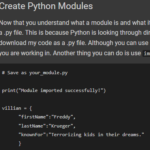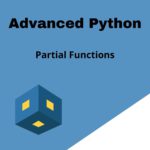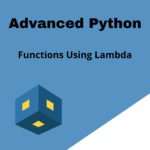🏗 Under Construction 🏗
- Python Modulesby Jack FlintIn this post, we will learn how to use and create Python modules. Python Modules are a large part of programming by allowing developers to share their work with others. Not to mention that someone out there has run into a problem while coding and has come up with a solution. So when you are …
- Setsby Kevin FlintHelpful links Full Advanced Python Course Link Gitlab Code Page Additional Help at Python.org Google Colab: The Easiest Way to Code What is a python set? A set is a class created in Python to hold distinct elements within the same collection. You can create a set using the set() method, which converts any iterable …
- Generatorsby Kevin FlintHelpful links Full Advanced Python Course Link Gitlab Code Page Additional Help at Python.org Google Colab: The Easiest Way to Code Generators are a unique sort of function that will return what is called a lazy iterator. Lazy iterators are items that you may loop over like a list. But, unlike lists, lazy iterators do …
- JSON and Serializationby Kevin FlintHelpful links Full Advanced Python Course Link Gitlab Code Page Additional Help at Python.org Google Colab: The Easiest Way to Code What is data serialization in Python? Serialization is the act of turning a data object (for example, Python objects or Tensorflow models) into a form that allows us to save or transmit it, and …
- Partial Functionsby Kevin FlintHelpful links Full Advanced Python Course Link Gitlab Code Page Additional Help at Python.org Google Colab: The Easiest Way to Code What is a Python partial function? You may construct partial functions in Python utilizing the functools module’s partial function. Partial functions enable you to derive a function with fewer parameters and fixed values for …
- Exception Handlingby Kevin FlintHelpful links Full Advanced Python Course Link Gitlab Code Page Additional Help at Python.org Google Colab: The Easiest Way to Code What is exception handling in Python? Exceptions can be handled in Python using a try block. The operation that may produce an exception is placed within the try statement. The code that handles the …
- Regular Expressionsby Kevin FlintHelpful links Full Advanced Python Course Link Gitlab Code Page Additional Help at Python.org Google Colab: The Easiest Way to Code Why Use Regular Expressions A regular expression (regex) is a pattern of characters that defines a search pattern in the text. You may have used something similar called wild cards. The search pattern “ook” …
- Functions Using Lambdaby Kevin FlintHelpful links Full Advanced Python Course Link Gitlab Code Page Additional Help at Python.org Google Colab: The Easiest Way to Code What is a Python lambda function? Lambda functions are often used to create small, anonymous functions. They can be used wherever function objects are required that only contain a single line. Lambda functions are …
- Functions Multiple Argumentsby Kevin FlintHelpful links Full Advanced Python Course Link Gitlab Code Page Additional Help at Python.org Google Colab: The Easiest Way to Code What Are Function Arguments An argument is a value that is supplied to a function when it is called. Arguments may be variables, values, or objects passed to functions or methods as input. We …










